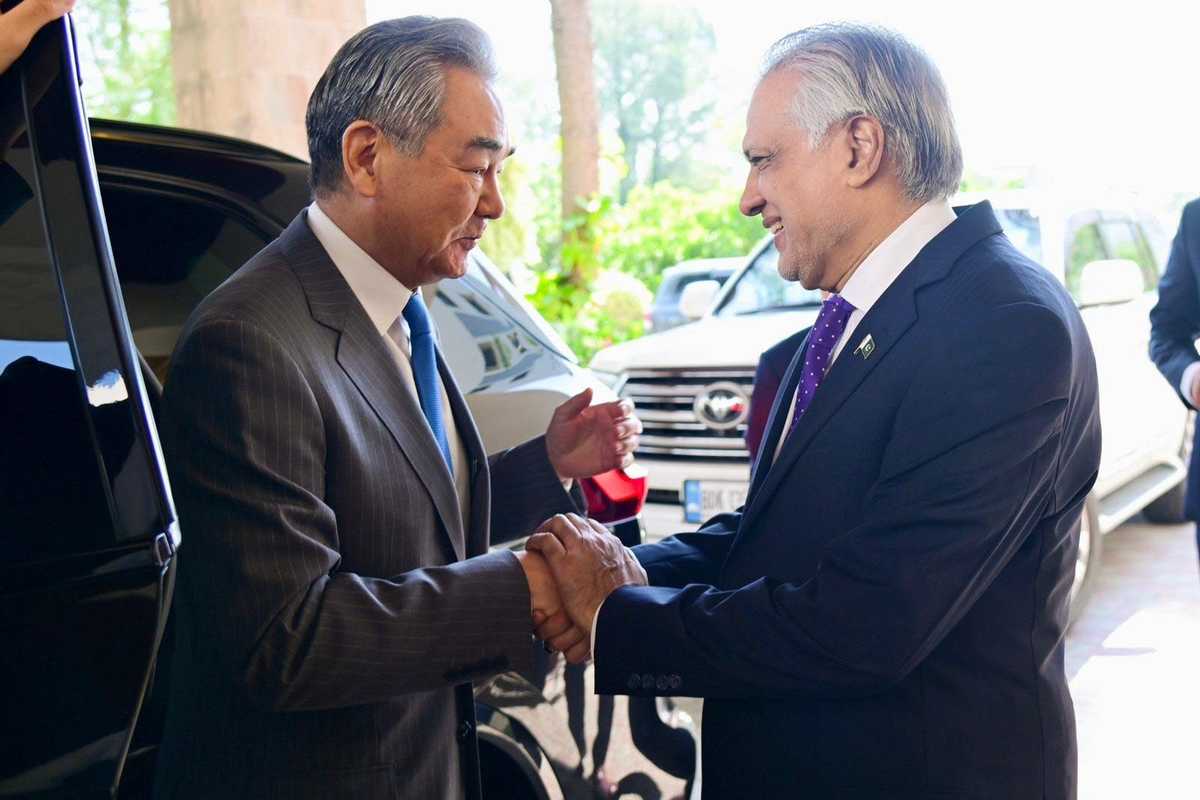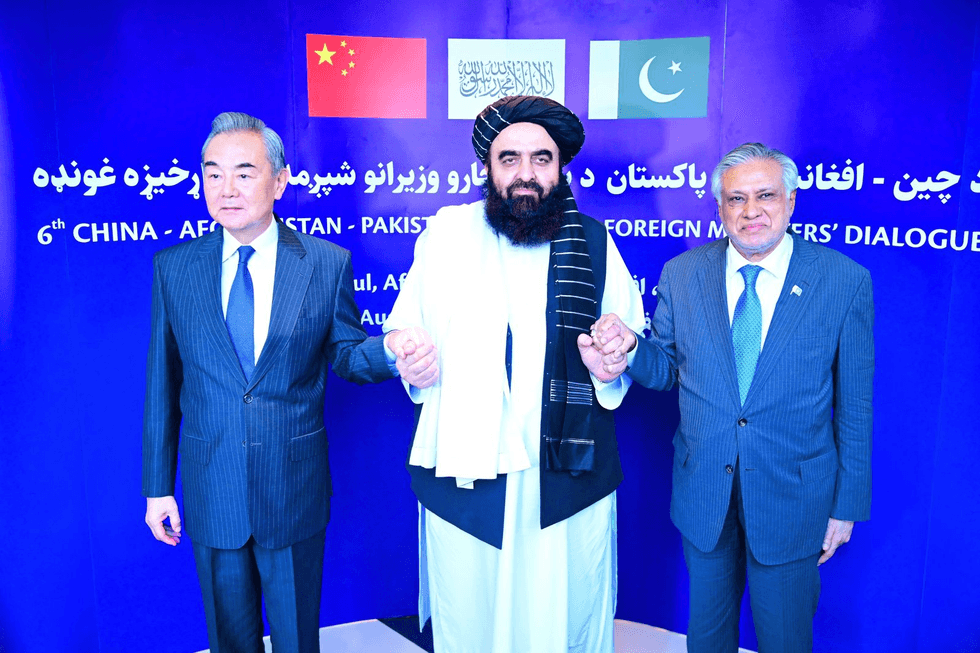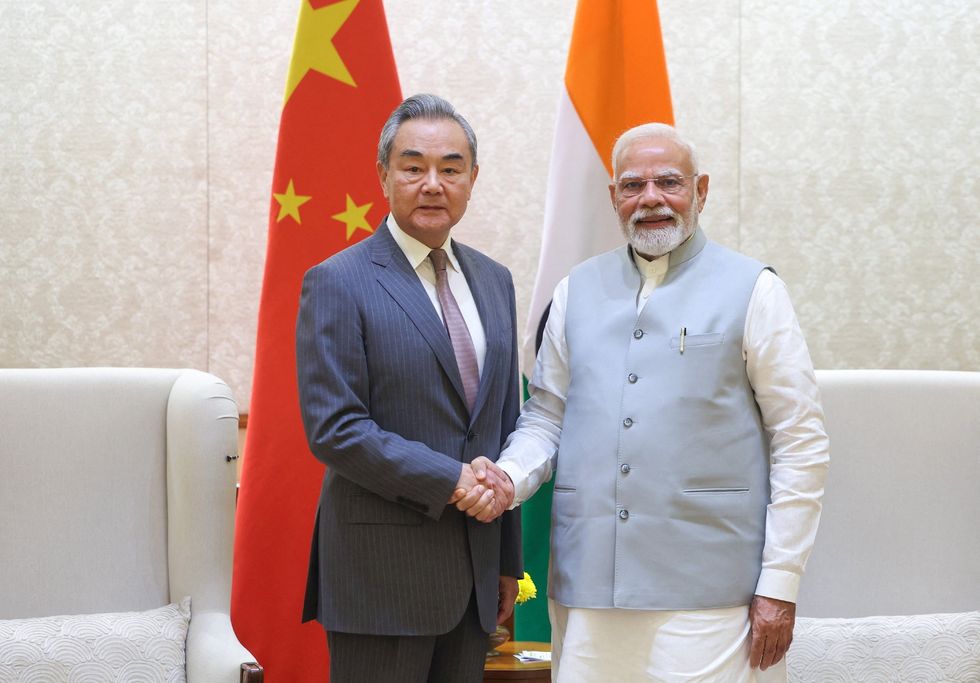News Desk
The News Desk provides timely and factual coverage of national and international events, with an emphasis on accuracy and clarity.

Chinese Foreign Minister Wang Yi arrived at Pakistan’s Ministry of Foreign Affairs on August 21, 2025. He was welcomed by Pakistan's Deputy Prime Minister and Foreign Minister Ishaq Dar.
PID
Chinese Foreign Minister Wang Yi arrived in Islamabad on Wednesday, where he was welcomed by Pakistan's Deputy Prime Minister and Foreign Minister Ishaq Dar for a series of high-level engagements aimed at strengthening ties between the two countries.
During the visit, Wang will hold bilateral talks with Dar to review Pakistan-China relations and discuss political, economic, and security cooperation.
A centerpiece of the trip will be the Sixth Round of the Pakistan-China Foreign Ministers’ Strategic Dialogue, co-chaired by the two ministers.
The forum, launched in 2018, provides a high-level mechanism to assess the full spectrum of ties, from advancing the China-Pakistan Economic Corridor (CPEC) and regional connectivity to joint efforts in counterterrorism and Afghan peace.
Both countries describe their “All-Weather Strategic Cooperative Partnership” as a cornerstone of regional stability.
Trilateral talks in Kabul
Wang’s arrival in Islamabad followed a trilateral meeting in Kabul, where Pakistan, China, and Afghanistan reaffirmed their commitment to counterterrorism cooperation and regional economic integration.
The Sixth Trilateral Foreign Ministers Dialogue brought together Dar, Wang, and Afghanistan’s Acting Foreign Minister Amir Khan Muttaqi. According to Pakistan’s Foreign Ministry, the three sides pledged to expand collaboration in trade, transit, development, health, education, culture, and combating drug trafficking.

Dar pressed Afghanistan to take firm action against militants launching cross-border attacks. He voiced concern over recent strikes allegedly carried out by the Tehreek-e-Taliban Pakistan (TTP) and the Balochistan Liberation Army (BLA)/Majeed Brigade from Afghan soil. Pakistan urged Kabul to implement “concrete and verifiable” steps to curb terrorism.
On the sidelines, Dar held bilateral talks with Muttaqi. Despite security concerns, both sides expressed satisfaction over growing ties, particularly in trade and transit. They welcomed the upgrade of diplomatic relations from Chargé d’Affaires to Ambassadorial level, a decision reached at a trilateral meeting in Beijing on May 21.
Muttaqi reiterated Afghanistan’s assurance that its territory would not be used by terrorist groups against Pakistan or other states.
India-China thaw
Wang’s Pakistan visit comes after his trip to India on Tuesday, where Beijing and New Delhi announced plans to restart direct flights, resume tourist visas, and reopen three border trade markets. The two sides also agreed to advance boundary negotiations following years of heightened tensions after a deadly border clash in 2020.
The thaw follows a rare meeting between Indian Prime Minister Narendra Modi and Chinese President Xi Jinping last October in Russia. Modi is expected to travel to China later this month — his first visit since 2018 — to attend the Shanghai Cooperation Organization summit and meet Xi.

Chinese Foreign Ministry spokeswoman Mao Ning said Tuesday that “both India and Pakistan are China’s important neighbors” and expressed hope that their differences could be managed properly. She described China and Pakistan as “ironclad friends and all-weather strategic partners.”
Beijing has invested tens of billions of dollars in Pakistan under its Belt and Road Initiative, funding massive transport, energy, and infrastructure projects.
In May, Wang expressed China’s support for Islamabad’s defense of its sovereignty and territorial integrity during talks with Dar. Days earlier, Pakistan and India had agreed to a ceasefire following a brief but deadly conflict triggered by an attack in Indian-administered Kashmir.
India’s pivot to Beijing
In a vlog, Kamran Khan described India’s growing outreach to China as a dramatic diplomatic pivot. He said the shift follows U.S. President Donald Trump’s decision to distance Washington from New Delhi after decades of close alignment.
“The world can see America has sidelined India,” Khan said, adding that Prime Minister Modi’s government had been left stunned.
According to Khan, India has revived the old strategic maxim rooted in Chanakya’s political thought: “The enemy of my enemy is my friend.” He noted that after years of hostility, New Delhi was now pursuing closer engagement with Beijing.
- YouTube www.youtube.com
Khan pointed to Modi’s planned Aug. 31 visit to Beijing as the most striking sign of change, describing it as a watershed moment in Indian foreign policy.
Despite tensions dating back to the 1962 war and the 2020 Galwan Valley clashes, Khan said economics was driving the rapprochement. China is India’s largest trading partner, with bilateral trade hitting $138 billion last year.
“India and China are carefully reviving their ties, but this reset is rooted in economic pragmatism, not renewed confidence,” Khan concluded. “Meanwhile, China’s ironclad alliance with Pakistan remains untouched and unshakable.”







Comments
See what people are discussing